Hello Readers! Hope you guys are safe and healthy during this pandemic. Today we are going to learn how to create a blog for free and make money in 2023. Your mind is home to plenty of ideas, thoughts, and opinions. Some people have amazing viewpoints. But, unfortunately, they don’t have the means to convey their views to the world.
This blog is entirely dedicated and carved for those people that require a platform to present their exemplary knowledge on their favorite niche.
You might have heard about “BLOGS”, you might have seen others writing and earning from“BLOGS”, you might have read others’“BLOGS” or you might have written one of yours.
CERTAINLY, it is a BLOG that can give a productive and progressive direction to the ocean of thoughts residing in your mind.
Here we’ve tried to give you a clear idea about blogging and earning money from your blogs.
Table of Contents
What is a Blog?
A blog, short for “weblog,” is a type of website or online platform where individuals or groups of people, known as bloggers, regularly publish content in a chronological and often informal manner. This content typically consists of written articles, but can also include images, videos, podcasts, or a combination of multimedia elements. Blogs cover a wide range of topics, interests, and niches, catering to diverse audiences.
Key features of a blog include:
Chronological Order: Blog posts are organized in reverse chronological order, with the most recent content appearing at the top of the blog’s homepage. Older posts are accessible through archives or by browsing the blog.
Content Categories or Tags: Blogs often categorize content based on topics or themes. Categories or tags help readers easily navigate and find posts related to their interests.
Authorship and Attribution: Each blog post is typically attributed to a specific author or contributor. Authors often have a bio or a brief description accompanying their posts.
Comments and Interaction: Blogs usually allow readers to leave comments on individual posts, facilitating interaction between the author and the audience. Comments can provide feedback, ask questions, or engage in discussions related to the content.
Archives: Blogs have archives that organize past posts by date, making it easy for readers to explore older content.
Search Functionality: Blogs typically include a search bar to help readers find specific content or topics within the blog.
Responsive Design: Modern blogs are designed to be accessible on various devices, including desktop computers, tablets, and smartphones, ensuring a seamless reading experience.
Blogs are utilized for a variety of purposes, including personal journals, professional or business-related updates, educational resources, entertainment, news dissemination, marketing, and more. Bloggers often write about their experiences, expertise, opinions, and interests, aiming to engage with their audience and build a community of readers who share similar passions or concerns.
Over time, blogging has evolved, and various blogging platforms and tools have emerged, making it easier for individuals to create and manage blogs without requiring extensive technical knowledge. These platforms often offer customizable templates, allowing bloggers to personalize the appearance of their blogs to align with their brand or style.
What Are the Benefits of Creating a Blog?
Blogging offers a wide array of benefits, both personally and professionally. Here are some of the key advantages of blogging:
1. Expression and Creativity: Blogging provides a platform for individuals to express their thoughts, ideas, and creativity. It allows writers to explore their passions and interests and share them with a global audience.
2. Developing Writing Skills: Blogging regularly helps in improving writing skills, including grammar, vocabulary, and overall communication. It encourages concise and effective expression of ideas.
3. Building an Online Presence: Blogging allows individuals to establish and cultivate an online presence. A well-maintained blog can help in personal branding and can be a valuable asset in the digital world.
4. Networking and Collaboration: Blogging enables interaction with like-minded individuals, creating opportunities for networking and collaboration. It can lead to meaningful connections with readers, fellow bloggers, and industry professionals.
5. Knowledge Sharing and Education: Blogging facilitates the sharing of knowledge and expertise on specific topics. Bloggers can educate their audience, providing valuable insights, tips, and information on various subjects.
6. Monetization and Income Generation: Successful blogs can generate income through various means, such as advertising, sponsored content, affiliate marketing, selling products or services, and more. It can potentially turn into a source of passive income.
7. Personal Growth and Development: Blogging encourages self-reflection and personal growth. It challenges individuals to think critically, research topics, and continuously improve their writing and presentation skills.
8. Enhancing Digital Marketing Skills: Blogging provides an opportunity to learn and apply digital marketing strategies, including SEO (Search Engine Optimization), social media promotion, email marketing, and content optimization.
9. Influence and Impact: A well-established blog can have a significant influence on its readers. Bloggers can shape opinions, raise awareness about important issues, and inspire positive change within their communities.
10. Portfolio and Career Opportunities: Blogging can serve as a portfolio showcasing an individual’s expertise and writing style. It can open doors to freelance writing opportunities, speaking engagements, consulting, and other career prospects.
11. SEO Benefits and Increased Website Traffic: Regularly updated, high-quality content on a blog can improve search engine rankings, leading to increased visibility and traffic to the blog and associated websites.
12. Therapeutic and Stress Reduction: Writing in a blog can be a therapeutic outlet, allowing individuals to express emotions, share experiences, and cope with life’s challenges. It can also reduce stress and anxiety by providing a means to organize thoughts and feelings.
13. Community Engagement and Feedback: Blogging encourages interaction with a community of readers. Feedback and comments from readers can provide valuable insights, helping bloggers refine their content and better understand their audience.
Blogging offers a range of personal and professional benefits, including creative expression, skill development, online visibility, income potential, and opportunities for personal and community growth.
Who Can Make a Blog?
Anyone can create and maintain a blog! Blogging is a versatile platform that is accessible to a wide range of individuals, irrespective of their background, profession, or expertise. Here’s a breakdown of who can make a blog:
Individuals: Anyone with an interest in sharing their thoughts, ideas, experiences, or expertise can create a blog. Personal bloggers often write about their hobbies, travel experiences, daily life, and more.
Professionals: Professionals in various fields such as finance, health, technology, education, fashion, and more can create blogs to share industry insights, tips, updates, and professional knowledge.
Businesses: Businesses often use blogs as a tool for content marketing. They share industry-related news, company updates, product information, customer success stories, and other relevant content to engage their audience and promote their brand.
Nonprofits and NGOs: Nonprofits use blogs to raise awareness about their causes, share success stories, provide educational content, and encourage donations or volunteerism.
Journalists and Writers: Journalists, authors, and writers often create blogs to showcase their work, share opinions, and engage with their readers. It can serve as a platform to publish articles, essays, and book updates.
Educators and Academics: Teachers, professors, and academics can use blogs to share educational resources, research findings, teaching methodologies, and academic insights.
Creatives: Artists, photographers, designers, and other creatives can use blogs to showcase their work, share their creative process, and connect with a broader audience.
Consultants and Coaches: Consultants and coaches can create blogs to share industry expertise, provide advice, offer tips, and attract potential clients.
Community Organizations: Community groups, clubs, or local organizations can create blogs to communicate with members, promote events, share news, and engage the community.
Entertainment and Media Professionals: Actors, musicians, filmmakers, and other entertainment professionals can use blogs to share updates about their projects, and behind-the-scenes content, and interact with fans.
Tech Enthusiasts: Individuals passionate about technology can create tech blogs to review products, discuss trends, share tutorials, and provide tech-related insights.
Blogging is for anyone with a desire to communicate and share information with an audience. It’s a powerful tool that enables individuals and organizations to reach people globally, express their thoughts, and engage with like-minded individuals.
How to Create a Blog for Free and Make Money in 2023?
Nothing is more soothing in this world than earning money from your passion.
Here are a few golden words by a great philosopher,
Do a work that you love, and you’ll not have to work for a single day for the rest of your life.
If you want to create a blog that earns millions of visitors every year but has tons of questions in mind like “how to create a blog for free in 2023?”, “What is the best way to create a blog that earns money?”, “Where to create a blog?”, or more, then here’s the step-by-step guide that will give answers to all your queries.
Choosing a Blogging Category to Create a Blog
“Something about Which You Would Love To Learn and Write About”
Some people have interests in doing or learning some particular work, whereas some don’t know which topic to pick.
However, a blogging topic should be the one you don’t get bored off. You don’t have to have a thorough knowledge of the topic, but opt something that you won’t get bored learning about. Some of the niches upon which people write blogs
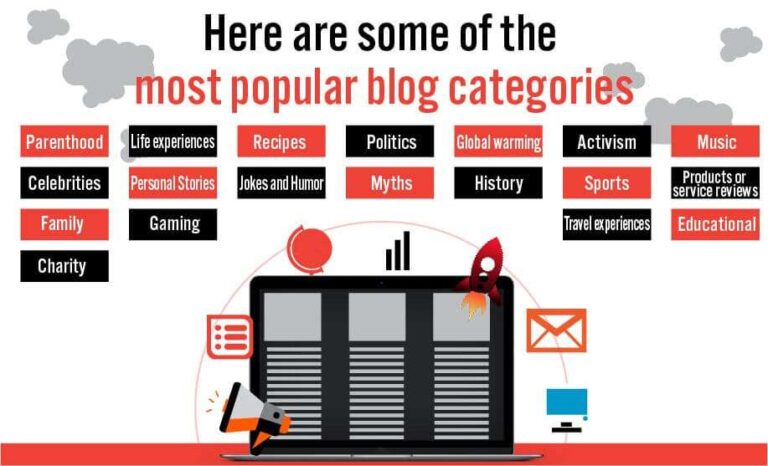
|
|
|
Choose a Domain Name to Create a Blog
“Choose a perfect domain name To give a unique Identification To Your Blog on the Internet”
Buying a domain name for the blog is the next step when you go all-out to create a blog.
The domain name would be the identification of your blogs on the Internet. It would be the address from which the readers would get access to your blogs.
Another factor associated with the domain of your blog is the domain extension. It is the last part of the domain name which specifies an Internet category or country code. For Example .com, .in, .co.uk, etc.
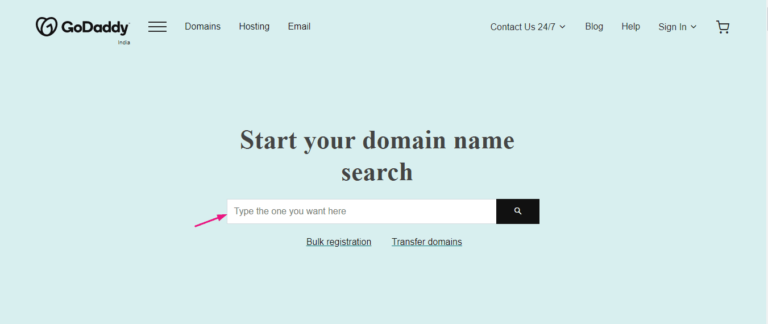
While it can be tough to get competitive domain names with a .com extension, you need not lose hope.
As there are more than 486 different domain extensions to choose from and you can choose one that is the perfect match to your blog very easily.
To make the best outputs and earn money from your blog, you should follow the tips given below while selecting a domain name to set up your blog:-
|
|
HOW MUCH DOES IT COST FOR A NEW DOMAIN?
To create a blog with unique identification you will have to pay domain costs approximately $10 per year.
Choose a Hosting Company to Create A Blog
“To be accessed through the Internet”
Website hosting providers provide services and technologies that are needed for the website to be viewed on the Internet. Know the website hosting costs.
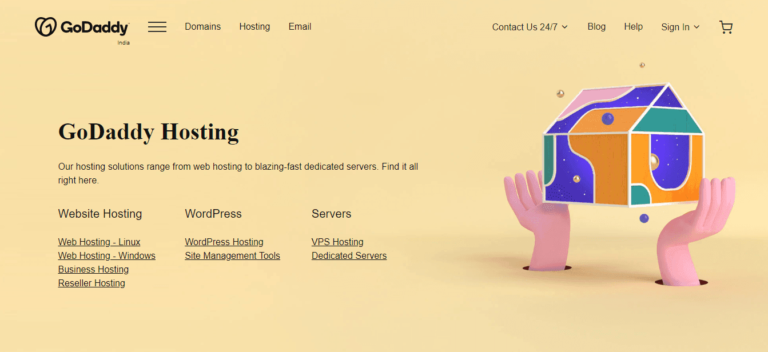
Once the hosting company hosts your website, readers can access it by typing in your web address (domain name) in their browser. When they do this, their computer joins to the server your website is hosted on.
HOW MUCH DOES IT COST FOR A NEW HOSTING?
To create a blog website/site you will have to pay approximately $10 per month for Hosting.
WHAT ARE THE DIFFERENT HOSTING COMPANIES?
- Bluehost
- HostGator
- Hostinger
- GoDaddy
- DreamHost
- SiteGround
- A2 Hosting
- WestHost
Choose Blogging Platforms to Create a Free Blog
To create a blog website you need blogging software.
A blog platform is a specific form of a content management system. The web address of the blog will end up being long and hard to remember. They won’t allow you to place ads on your blog. This makes it much harder to make money from blogging.
What Are Some Popular Blogging Platforms To Create a Blog For Free?
WORDPRESS
There are two versions of WordPress. The first is WordPress.com and the other one is WordPress.org. Go through the section below to know the difference between them:-
How to Create a FREE Blog on WordPress in 2023?
WordPress.com is a platform that gives you the ability to create a blog for free at zero investment, you don’t even have to buy a domain to have your blog hosted, instead, it gives you a sub-domain like myblog.wordpress.com.
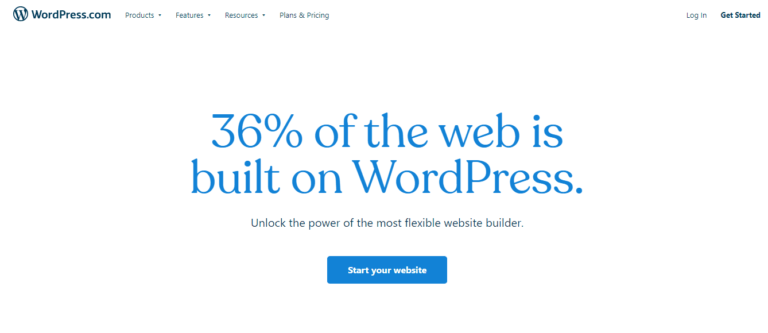
Now here a question arises, “ how to create a blog on WordPress” or “How to create a blog page in WordPress”.
To create a blog website on WordPress, all you need to do is download and install the latest version of WordPress and get started with it!
It is one of the most adopted platforms by most bloggers due to its easy-to-use feature. It is well suited for the following types of bloggers:
- Bloggers who just want to spend their free time blogging i.e. for those who take this as their hobby.
- Career-oriented bloggers who don’t care about the sub-domain, their primary concern is to have all the essential features which are required for them.
The most attractive feature of WordPress.com that attracts most bloggers is Zero Investment. WordPress offers you many themes that are predesigned and also offers Premium plans which give you the ability to have a custom web design of your choice, all these features make WordPress websites the best platform to create a blog.
Also Read: Blogging Vs Vlogging? Which One Is Better for Earning?
WORDPRESS.ORG
Some people want to have a self-hosted version to get several customizable themes and to advertise and market the products and services of their business. Such people can choose to go with the WordPress.org version.
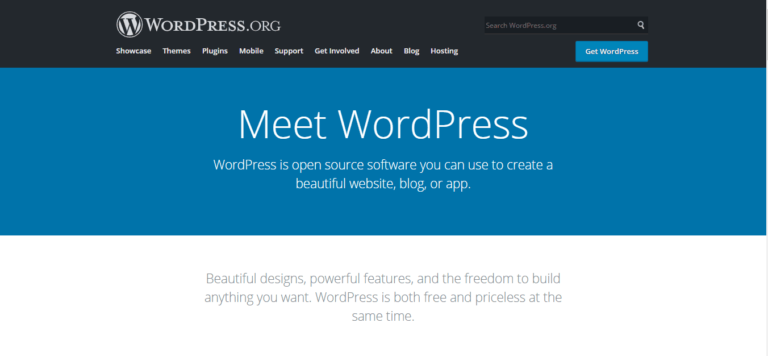
WordPress.org offers thousands of free themes and a lot more which are to be adopted on a payment basis, to make look and feel more attractive this version provides additional functionality that includes plugins and extensions which makes the blog more dynamic and responsive.
Bloggers for whom this is well suited are:
- Hobby Bloggers who want to share their thoughts in a more creative format.
- An organization who want to have a blog associated with their business website for marketing purpose.
Note: If you are not very concerned about advertisement and monetary benefits you can go for WordPress.com which will be more cost-effective in that case.
Also Check: How To Promote A Facebook Business Page?
BLOGGER
Blogger is owned by Google. It is quite similar to the WordPress platform as it also offers a Zero Investment blogging website with a sub-domain like myblog.blogspot.com.
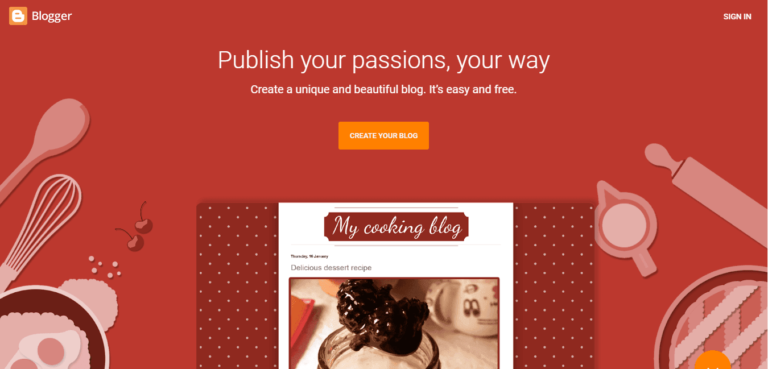
How to Create a Blog on Blogger for Free?
Now here the question arises, “How to create a blog on Blogger” Since Blogger is owned by Google, the question can also be in the form “How to create a blog for free on Google”.
To create a blog website for free on Blogger, you just need to sign in with your Google account and give a few minutes for the setup to complete and you are all set to have your blog go live!
It also offers a premium plan for which you have to pay to enable access to a customized design of your own.
It is suitable for bloggers who blog for fun in their free time and for the ones who love to share their personal experiences.
TUMBLR
Tumblr is a well-known blogging platform that is specially designed for bloggers who want to post short content which is referred to as microblogging.

How to Create a Blog on Tumblr for Free?
If you are a beginner and want to try your skills as a blogger it might become your choice but it limits the length of the content.
It is used in the following fields:
- Post short video
- Create GIF images
- Create Photo Posts
Just like WordPress and Blogger, Tumblr also offers a free blogging environment and provides a sub-domain like myblog.tumblr.com, which you can modify but hold on there is a difference most of the customization in designs needs to be purchased.
MEDIUM

Medium has become one of the most adaptable blogging platforms for bloggers who want their opinion to be recognized and seen by the world concerning certain topics of their choice.
How to Create a Free Blog on Medium.com?
If anyone wants to publish a blog on medium, he/she has to create a profile that resembles medium.com/@myname.
This profile name can be used by him/her for posting various content. Medium also gives the ability to hit like and recommend it to their known people which can viral the content within a short period.
The design of the Medium environment for blogs is immutable and even if you want to have a profile to be linked with your content you need to buy this feature.
It can be the first choice for bloggers like:
- Ones who want to create a blog to get individuality in the field of blogging.
- Corporate Bloggers who want to have an existing blog site apart from their company’s primary website.
DRUPAL
Drupal is a Content Management Solution just like WordPress. All you need to use Drupal is just need to download and install it from the web.
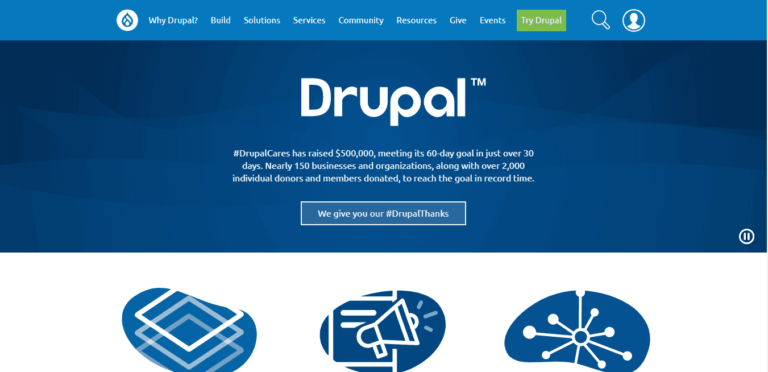
How to Create a Blog on Drupal for Free?
However, there are a few key differences between WordPress and Drupal which includes the following points:
- Drupal doesn’t offer hosting and domain name which needs to be purchased by the blogger separately.
- For beginners it is not well suited as it is a difficult platform to learn. It requires experience in handling the Drupal environment.
It is highly recommended for the Bloggers who are highly skilled in Web Development and are well aware of the platform and knows exactly what needs to be done.
JOOMLA
Joomla is a relatively powerful and advanced Content Management System from other blogging platforms. It can be a primary choice for bloggers who want to have a flexible environment to express their views.
How to Create a Blog on Joomla for Free?
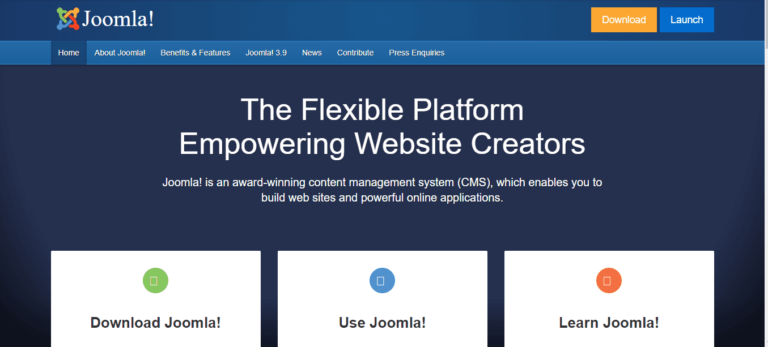
But with a flexible and powerful nature, it comes hand in hand with complexity, it requires experience to have smooth handling.
Limited support drives the platform and is highly expensive, it provides certain free solutions just for a month and after that, you are bound to have paid service to continue the functionality. You even need to purchase the domain name and hosting to make it go live.
It can be opted by the bloggers who are well skilled in Web Development and who have a well-established business who want to create a brand name for their company.
WEEBLY
Weebly is considered a full-fledged platform for blogging purposes and also for creating a fully functional website for a business. It is very handy i.e. ease of use is a well-known feature of this platform.
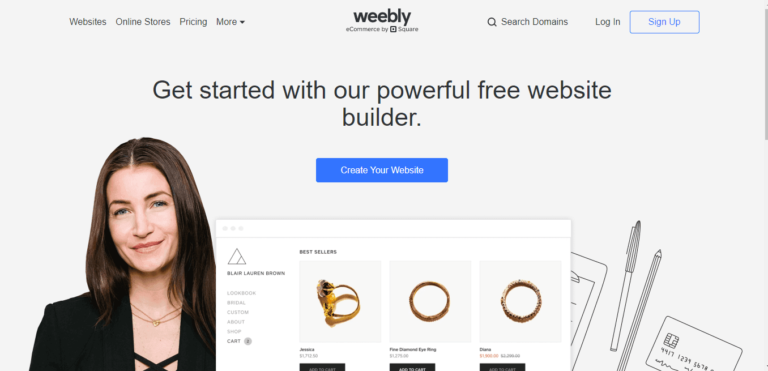
How to Create a Blog on Weebly for Free?
It contains a package of web design tools that can be dragged and dropped to a specified location on the given web page.
It has several themes that can be customized as per the needs of the blogger. It offers a free blogging solution for a certain period and needs to be purchased after that to continue with your blogging passion.
It is well suited for bloggers who find love in sharing their experiences in their free time, like hobby bloggers.
MAGENTO
Magento is a well-known platform widely used for running an eCommerce website and giving an environment to create a blog.
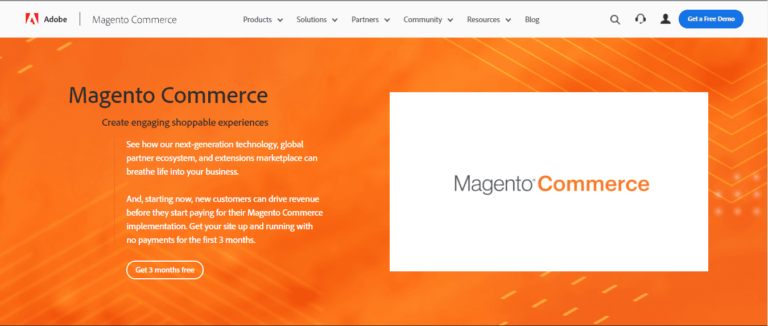
How to Create a Blog on Magento for Free?
To have Magento opted for blogging purposes you require technical skills like programming capabilities and you should take a good amount of time to learn before starting, it is not that hard to learn. It is well suited for visionaries who have a goal for the coming years.
It is recommended for:
- Bloggers who want to advertise the eCommerce.
- A skilled Web Developer who well knows about the prevailing trends and technology.
These are some of the blogging platforms which you can make use of to create your blog. This step-by-step approach is the easiest and best way to create a blog and can help you make money from your blog.
Best Practices for Creating a Blog
Creating a successful blog involves more than just writing posts and publishing them. It requires strategic planning, engaging content, effective promotion, and ongoing management. Here are some best practices to help you create a successful blog:
1. Define Your Purpose and Niche:
Clearly define the purpose of your blog and identify your target audience.
Choose a specific niche or topic you are passionate about or have expertise in.
2. Understand Your Audience:
Conduct audience research to understand your readers’ preferences, needs, and interests.
Tailor your content to address your audience’s challenges, questions, and aspirations.
3. Create a Consistent Branding:
Develop a unique brand identity, including a memorable logo, color scheme, and design elements that align with your blog’s theme and target audience.
4. Choose the Right Blogging Platform:
Select a reliable and user-friendly blogging platform such as WordPress, Blogger, or Wix that suits your technical skills and customization needs.
5. Optimize for SEO:
Conduct keyword research and use relevant keywords naturally within your content.
Optimize meta titles, descriptions, headings, and image alt text for search engines.
6. Focus on Quality Content:
Create valuable, well-researched, and informative content that resonates with your audience.
Use a compelling writing style and include visuals like images, infographics, or videos to enhance engagement.
7. Engage with Your Audience:
Encourage comments and discussions by asking questions and responding to comments promptly.
Utilize social media to engage with your audience and share your content.
8. Maintain a Consistent Posting Schedule:
Stick to a consistent posting schedule to keep your audience engaged and returning for fresh content.
Quality should always be prioritized over quantity.
9. Leverage Email Marketing:
Implement email capture forms to build an email list and stay connected with your audience.
Send regular newsletters with blog updates, promotions, or exclusive content.
10. Promote Your Blog Effectively:
Utilize social media, guest posting, influencer collaborations, and other promotional strategies to increase your blog’s visibility.
Join blogging communities and forums to connect with fellow bloggers and share your content.
11. Monitor and Analyze Performance:
Use analytics tools to track and analyze your blog’s performance, including traffic, engagement, and conversions.
Use these insights to make data-driven decisions and optimize your content strategy.
12. Ensure Mobile Responsiveness:
Optimize your blog for mobile devices to provide a seamless user experience on all screen sizes.
13. Ensure Legal Compliance:
Understand and comply with legal requirements, including copyright laws, privacy policies, and terms of use.
14. Learn and Adapt:
Stay updated with industry trends, new tools, and best practices to continuously improve your blog.
Be open to feedback and adapt your strategies based on what works best for your audience.
Creating a successful blog takes time, dedication, and a willingness to continuously learn and evolve. By following these best practices and staying committed to providing value to your audience, you’ll increase your chances of building a thriving and influential blog.
How Much Does it Cost to Create a Premium Blog?
The cost of creating a blog can vary widely depending on several factors, including your goals, preferences, and the level of professionalism and customization you seek. Here’s a breakdown of potential costs associated with creating a blog:
Domain Name: This is the web address for your blog (e.g., www.yourblogname.com). Domain names typically cost around $10 to $20 per year, although premium or highly sought-after domain names may be more expensive.
Web Hosting: Hosting is necessary to store your blog’s files and make it accessible on the internet. Hosting costs vary based on the provider, hosting plan, and features offered. Shared hosting, suitable for beginners, can start at around $3 to $10 per month. As your blog grows, you might consider more robust hosting options, such as VPS (Virtual Private Server) or dedicated hosting, which can range from $20 to several hundred dollars per month.
Content Management System (CMS): Popular CMS platforms like WordPress, Joomla, and Drupal are often free to use. However, you might need to invest in premium themes (ranging from $20 to $100+) or plugins/extensions (varying costs) to enhance your blog’s design and functionality.
Design and Themes: While many CMS platforms offer free themes, you may opt for a premium theme to give your blog a unique and professional look. Premium themes can range from $20 to $200 or more, depending on the features and customization options.
Plugins and Extensions: Some plugins and extensions for added functionality might be free, while others could be premium and cost anywhere from $10 to $100 or more per year.
Additional Features and Customizations: Depending on your blog’s requirements, you might incur costs for additional features like e-commerce capabilities, membership sites, forums, custom coding, etc. The costs for these can vary significantly based on the complexity and customization needed.
Graphic Design and Images: If you require custom graphics designing, logo design, or images for your blog, you may need to invest in graphic design services or purchase stock images. Costs can vary based on the complexity of the design and the source of the images.
Marketing and Promotion: While not an initial setup cost, promoting your blog may involve expenses such as social media advertising, email marketing, SEO tools, etc., to drive traffic to your blog with SEO Services.
It’s important to note that you can start a blog with minimal investment, especially if you choose free options for hosting and themes. As your blog grows and you want to enhance its functionality, and appearance, or reach a larger audience, you can consider investing in premium website features and services. It’s essential to assess your needs, budget, and long-term goals to determine the appropriate level of investment for your blog.
Are You Looking to Make a Blog for Personal Use? Lets Talk!
If you have any queries or face any trouble when you start to create your blog, then unhesitatingly contact a premier digital marketing company Rankon Technologies to get the answer to all your queries. We are a leading website development company offering the best quality website designing services for businesses at very low prices. Know how much does website costs.
FAQs on Creating a Blog
Yes, you can monetize your blog through various methods such as advertising, affiliate marketing, sponsored content, selling products or services, memberships, and donations.












